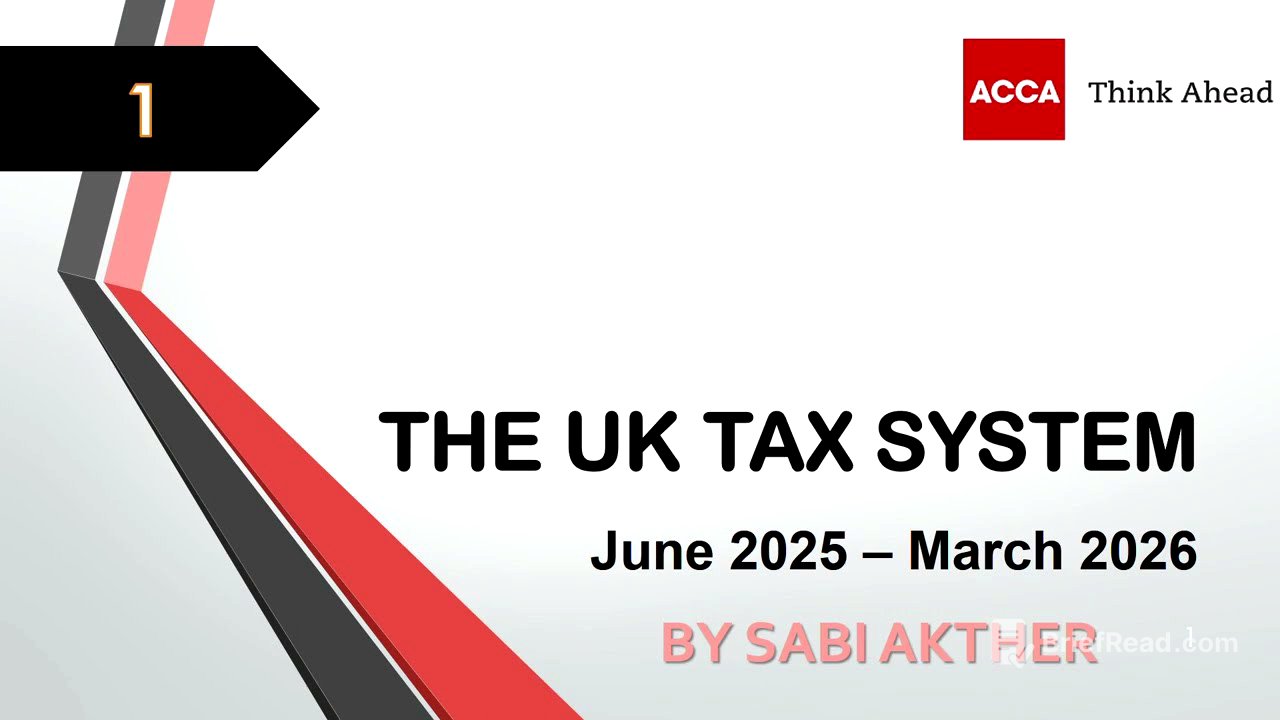TLDR;
This video serves as an introductory lecture on UK tax law, specifically tailored for the ACCA syllabus applicable from June 2025 to March 2026, based on the Financial Act 2024. It outlines the scope of the syllabus, the purpose of taxation, and the types of taxes to be studied, including income tax, capital gains tax, inheritance tax, corporation tax, and VAT. The lecture also touches on taxable periods, tax status, double taxation agreements, and the administration of the UK tax system, emphasizing the roles of HMRC and professional tax advisors, as well as the concepts of tax avoidance and evasion.
- Overview of UK tax system and its administration.
- Explanation of direct vs. indirect taxes and capital vs. revenue taxes.
- Discussion of tax residency rules for individuals and companies.
- Importance of ethical and professional conduct for tax advisors.
Introduction to UK Tax [0:01]
The lecture introduces UK tax for ACCA students, covering the syllabus applicable from June 2025 to March 2026, based on the Financial Act 2024. While ATX videos will require a purchase, tax lectures will be available for free on YouTube, comprising 22 lectures in total. The initial lecture provides an overview of the UK tax system, including the syllabus scope, the purpose of tax in the economy, and relevant taxes.
Syllabus Scope and Tax Types [2:14]
The lecture focuses on the scope of the syllabus, detailing the five main taxes: income tax, capital gains tax (CGT), inheritance tax, corporation tax, and VAT. It highlights that these taxes differ in calculation methods and purposes. A strong understanding of these taxes is crucial for those planning to take ATX, as it builds upon these basics with more complex scenarios.
Taxable Periods and Tax Status [3:20]
The discussion covers taxable periods, which include tax years for personal taxes, accounting periods for corporation tax, and tax periods for VAT. Tax status is also examined, focusing on the residence of individuals and companies, which is critical for determining tax liabilities. The lecture mentions the importance of double taxation agreements and how the UK tax system is administered, including self-assessment and the roles of HMRC and professional tax advisors.
Taxation's Economic and Social Roles [7:06]
Taxation serves two main economic roles: funding government expenditure and influencing demand through macroeconomic management. It also plays a crucial role in social objectives, such as redistributing wealth. The UK tax system encourages savings, pension contributions, and charitable donations through tax incentives, while discouraging certain behaviors like motoring, smoking, and drinking through duties and taxes.
Direct vs. Indirect Taxes [9:46]
Taxes are categorized into direct and indirect taxes. Direct taxes, including income tax, capital gains tax, corporation tax, and inheritance tax, are directly collected from the taxpayer. Indirect tax, specifically VAT, is collected from the supplier, who then collects it from the taxpayer. Most countries use a combination of both direct and indirect taxes.
Capital vs. Revenue Taxes [12:30]
Capital taxes are levied on assets owned, while revenue taxes are on income and profit. Revenue taxes include income tax and corporation tax, whereas capital taxes include inheritance tax and capital gains tax. National Insurance contributions (NIC) are also considered a type of tax in the UK.
Types of Taxes in Detail [13:57]
The lecture provides a detailed overview of various taxes, including income tax, corporation tax, capital gains tax, inheritance tax, VAT, and National Insurance contributions (NIC). Income tax applies to individuals on their income, while corporation tax is for companies on their profits and gains. Capital gains tax is triggered when disposing of chargeable assets, and inheritance tax is on inherited assets. VAT is paid on taxable supplies of goods and services, and NIC is contributed by employees, employers, and the self-employed.
Income Tax, CGT, and Inheritance Tax Scope [20:01]
Income tax is generally applicable to individuals with income arising in the UK or to UK residents receiving income from outside the UK. Capital gains tax applies to gains arising inside or outside the UK, provided the taxpayer is a UK resident. Inheritance tax is relevant when transferring property inside the UK or when the transferor is a UK domiciled individual transferring property outside the UK. The syllabus primarily focuses on income and gains arising in the UK and capital transfers of UK property.
Corporation Tax and VAT Scope [24:15]
Corporation tax is levied on companies' income and chargeable gains, whether sourced from within the UK or abroad, depending on the company's residency. VAT is charged on taxable supplies where the place of supply is in the UK.
Tax Periods: Personal, Corporation, and VAT [25:05]
Personal taxes, including income tax, CGT, and NIC, are assessed on a tax year basis, running from April 6th to April 5th of the following year. Corporation tax is assessed on an accounting period basis, typically 12 months. VAT is usually assessed quarterly, based on a tax period of three months.
Tax Status: Residency and Domicile [29:16]
Tax status is determined by residency and domicile. UK residents are taxed on their worldwide income, while non-UK residents are taxed only on income arising in the UK. For inheritance tax, domicile is a key factor. Determining residency involves a statutory residency test with three stages: automatic non-residency, automatic residency, and ties to the UK.
Residency Tests for Individuals [31:19]
The residency test for individuals involves three stages. The first stage, the automatic overseas test, identifies conditions under which an individual is automatically considered a non-UK resident. The second stage, the automatic UK resident test, specifies conditions for automatic UK residency. The third stage involves checking ties to the UK, such as family, accommodation, work, and time spent in the country.
UK Ties and Residency Determination [38:10]
The application of the sufficient ties test depends on whether a person has been a UK resident in any of the previous three tax years. The five ties include family, accommodation, work, 90-day presence, and country tie. The country tie is only relevant if the person was a UK resident in any of the previous three tax years.
Residency of a Company [46:05]
UK resident companies are charged corporation tax on their worldwide profits. A company is considered a UK resident if it is incorporated in the UK or if its central management and control are located in the UK. Central management and control refer to the highest level of control within the company, such as the parent company or the board of directors.
Double Taxation Agreements [47:29]
Double taxation agreements aim to prevent income from being taxed twice in different countries. These agreements specify which territory has the right to tax. If no tax treaty exists, the UK allows unilateral relief, providing a tax credit in the UK for overseas tax paid, based on the lower of the UK tax or the overseas tax paid.
Structure of the UK Tax System [49:50]
HMRC (HM Revenue and Customs) is responsible for assessing and collecting UK taxes, administering child benefits and tax credits, enforcing the national minimum wage, and recovering student loans. Taxpayers can appeal against HMRC decisions within a certain time limit, initially to HMRC and then to the First-tier Tribunal or Upper Tribunal. HMRC is a non-ministerial government department accountable to the Chancellor of the Exchequer.
Self-Assessment and Tax Returns [52:39]
The UK tax system operates on a self-assessment basis, where taxpayers make regular tax returns or declarations, calculate their tax liability, and pay the tax due. Each person must submit a personal tax return and separate tax computations for each tax year. Even members of a group of companies must calculate their own tax return.
Tax Reliefs and HMRC Responsibilities [56:47]
Individuals and companies can claim reliefs, specific tax treatments, or losses within four years of the end of the relevant tax year or accounting period. HMRC issues and reviews tax returns, conducts compliance checks, manages tax collection, and imposes penalties for late payments or incorrect returns. Inheritance tax is not self-assessed; HMRC determines the amount of tax due.
Professional Tax Advisors: Roles and Ethics [59:19]
Taxpayers may appoint professional tax advisors to complete tax returns, agree on tax liabilities, and handle disputes with HMRC. Professional advisors must exercise their duties competently, avoid conflicts of interest, maintain proper records, and act ethically. They must adhere to the five codes of ethics: confidentiality, professional behavior, professional competence, care, integrity, and objectivity.
Ethical Guidance and Tax Irregularities [1:01:06]
Professional bodies provide guidance on procedures to follow in case of tax irregularities. Advisors should explain the situation to the client and recommend disclosure to HMRC. If the client refuses, the advisor should provide a formal written advice outlining the consequences. If the client still refuses, the advisor must cease to act for the client, notify HMRC without disclosing the reasons, and consider reporting the matter under money laundering regulations.
Tax Evasion vs. Tax Avoidance [1:04:41]
Tax evasion is the illegal underpayment of tax through fraud or negligence, such as not disclosing income or making false returns. Tax avoidance, on the other hand, is a form of tax planning that minimizes tax through legitimate means within the tax law. However, if tax avoidance schemes are deemed abusive, HMRC may counteract them through anti-avoidance legislation.
General Anti-Abuse Rule (GAAR) [1:06:41]
The General Anti-Abuse Rule (GAAR) was introduced to control abusive tax avoidance arrangements. If HMRC determines that a tax arrangement is not a reasonable course of action, it can make adjustments to counteract the tax advantages gained.
Sources of Tax Law [1:08:37]
The sources of tax law include statutes, case law, and HMRC statements of practice. Statutes are the Finance Acts passed each year. Case law consists of judgments made in the high court, court of appeal, and the Supreme Court. HMRC statements of practice and extra-statutory concessions provide interpretations and relaxations of the strict application of the law.
Syllabus Coverage and Key Points Summary [1:10:52]
The lecture covered Section A of the syllabus, including the UK tax system and its administration, the function and purpose of taxation, the difference between direct and indirect taxes, capital and revenue taxes, sources of revenue law, the structure of the UK tax system, HMRC's organization, the General Anti-Abuse Rule, the difference between tax avoidance and tax evasion, the interaction of the UK tax system with other jurisdictions through double tax agreements, and the need for an ethical and professional approach. It also covered the scope of income tax and how residency is determined for individuals and corporations from Section B.









